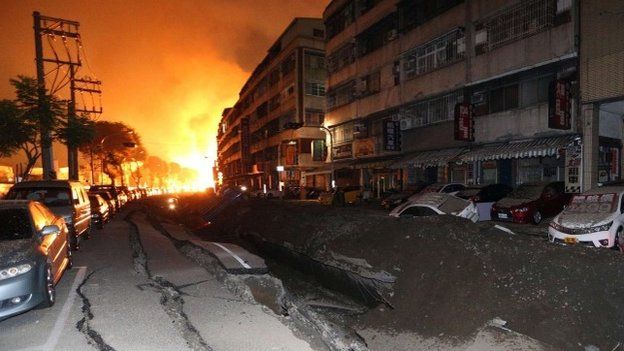Taiwan charges 12 over deadly Kaohsiung gas blasts
- Published

Twelve people have been charged in Taiwan over deadly gas blasts that prosecutors say were caused by multiple human errors.
The blasts in the southern city of Kaohsiung in July killed 32 people and injured more than 300.
Whole sections of road were ripped open and cars scattered by the blasts, which were caused by leaking propene from an underground pipeline.
The head of the pipeline operator is among the 12 people charged.
Prosecutors say LCY Chemical failed to maintain the pipes.
The 11 other people charged include LCY employees, three employees of a subcontractor tasked with delivering propene, and three former officials accused of inadequate monitoring of the pipeline construction in the 1990s.
Prosecutors say the public works bureau violated guidelines when they allowed a drainage culvert to be built crossing the pipeline, reports the BBC's Cindy Sui in Taipei.
Over the years, the drainage channel exposed the four-inch pipeline to air and moisture, causing it to corrode and eventually rupture.
Second, state-owned oil refiner CPC, which had built the pipeline, tested it only twice in the past 23 years.
Had it paid attention, it would have discovered the drainage pipe was illegally constructed around its pipeline, prosecutors said.
But prosecutors put most of the blame on LCY, which bought the pipeline from CPC in 2007, accusing it of making no effort to inspect or maintain it, our correspondent adds.
It and the company hired to deliver the gas also did not stop the process when their employees discovered what they suspected was a leak, prosecutors said.
Prosecutors, however, did not charge five top city officials, including the mayor, saying they were not deliberately lax in their response.
The officials were widely criticised for not responding fast enough, after residents reported a chemical leak eight hours before the blasts occurred.
- Published1 August 2014
- Published1 August 2014
- Published15 January